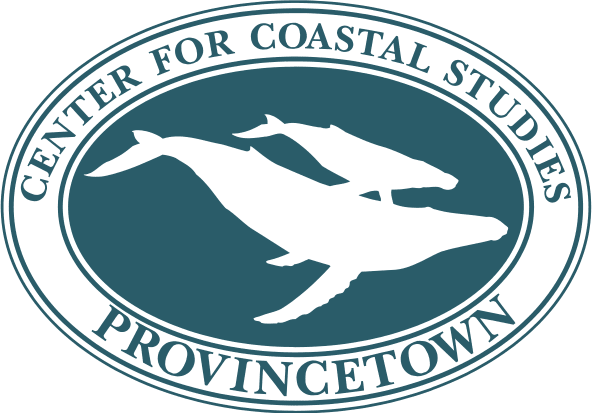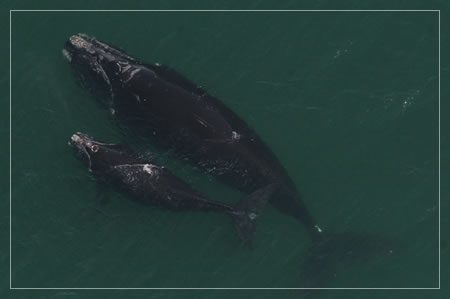January 2, 2024
Having ended last year on a high note with a total of 4 right whales observed during our survey of the southeast of Nantucket on December 23rd, we were eager to take to the sky for our first flight of the winter season.
We took off from Provincetown Municipal airport at 09:00 on Tuesday morning to survey our Cape Cod Bay (CCB) lines from south to north. We had a sighting of one unidentified seal at the end of our eastern shore trackline; however, to our surprise absolutely no other marine mammals were seen in CCB.
While the lack of sightings was disappointing, it did provide us with the opportunity to extend our survey northwards into Massachusetts Bay. The trend of no marine mammal observations continued as we flew our Mass Bay lines and just as we began to lose all hope, we encountered 17 unidentified dolphins on our second to last line (a good omen of better things to come) …
Finally, at the beginning of our last trackline we encountered a total of 4 humpback whales and observed bubble net feeding behavior during the sighting – we were thrilled to get to see some action after an uncharacteristically quiet survey! Four other humpbacks were seen before we had to wrap up our survey effort and return back to the airport.
We continue to patiently await the arrival of right whales in Cape Cod Bay, & hope that our next survey will be filled with plenty of marine mammal sightings and exciting encounters.
– Ashley
January 12, 2024
Happy (belated) New Year! We kicked off the beginning of the 2024 season with a joint water quality cruise, heading out bright and early Friday morning into Cape Cod Bay. While the swell was a bit rough in the morning, the wind soon died down and we had a beautiful sunny day to carry out our sampling procedures. Visibility was great, with clear skies lasting from sunrise to sunset.
Like the rest of the team, I was hoping to be the person to spot the first right whale of the season here in the Bay, but it appears they continue to be fashionably late. No whales of any kind were spotted on this cruise, and our habitat scientists were hard at work helping explain why. One of the right whale’s favorite food sources is the usually abundant amount of Pseudocalanus zooplankton found in the colder waters off Cape Cod – food that has been slow to bloom this year. Our associate scientist Christy Hudak and 2024 Habitat Intern Shreya Vindoh deployed a number of plankton tows from nine different stations across the bay as part of ongoing resource and biodiversity monitoring. This monitoring effort previously found that the abundance of Pseudocalanus in December 2023 was lower than had been observed historically. However, tows deployed on this cruise showed that levels had risen since then, hopefully signaling that the whales won’t be too far behind.
The habitat team also deployed an environmental DNA, or eDNA, sampler at some of our stations. This is a collection strategy that aims to extract genetic material left behind by living organisms by way of the environment with which they interact. In our case, the water samples Christy and Shreya collected will have trace amounts of DNA from a number of species and is part of the Cape Cod Bay Biodiversity Project, which aims to determine prey biodiversity including fish, benthic invertebrates, and zooplankton. The project is a collaboration with a number of CCS departments such as marine fisheries, water quality, benthic ecology, and seal research.
Projects like the biodiversity initiative are much more closely related to understanding large marine mammals than one might initially think, and research initiatives like the eDNA sampling only help broaden our understanding of the marine environment. So while we may not have seen any right whales on this cruise, we have a few more resources to answer our questions.
– Morgan
January 24, 2024
We kicked off the second right whale cruise of the season with right whales in Cape Cod Bay!
The aerial team saw two right whales on Stellwagen Bank on January 12th that may have been heading towards Cape Cod Bay, but bad weather has kept both the aircraft and vessel from conducting any surveys until now. We set out at 8:20am under grey skies and light rain with a 5-hour window to try and locate right whales, photograph them for photo-ID, and collect samples of zooplankton that they may be feeding on.
We headed west and had only been transiting for about 30 minutes when we saw a pair of large, black bodies at the surface straight ahead! These were the first right whale sighting from the vessel, as well as our first documented right whales in Cape Cod Bay this season! We headed over to begin capturing images of them, but it quickly became apparent that catching a glimpse of these whales was one thing, while getting close for good documentation was its own challenge. The animals were traveling while staying below the surface for 5-15 minutes, which made tracking them difficult. Over the next 2 hours we attempted to get close enough to photograph these whales, but they would go below the surface almost as quickly as we could locate them. Often we’d only see their flukes in the air as they dove, suggesting that they were going deep and would be down for several minutes. Eventually, we made the call to head back to Provincetown, as rain and fog were starting to impede our sighting conditions.
Just as we were giving up hope that we would be photographing right whales today, we caught a glimpse of a right whale feeding at the surface between us and Wood End Lighthouse. We headed over and realized that there were two individuals feeding at and just below the surface, making them much easier to document than the whales that were eluding us earlier. These two turned out to be #1701 Aphrodite, a 37-year old female & #3370 Archipelago, an adult female that was first observed in 2003. Interestingly, both of these individuals had calves just last season.
We’re hoping that the plane and boat can continue to get out for more surveys so that we can see who else is waiting for us in the bay!
– Morgan, Annie & Ryan
January 31, 2024
Strong winds and low clouds had prevented us from flying for the last 19 days, but we finally had good weather conditions for an aerial survey. We had seen right whales from the beaches in Provincetown this weekend so we were eager to survey Cape Cod Bay, but lack of recent survey effort in Massachusetts Bay meant that we’d be heading north today. The plan was to start our East-West survey lines off Marshfield and work our way north until we eventually reached the New Hampshire border.
Although the coastal Massachusetts water were bustling with fishing vessels and the occasional coast guard vessel, there were no marine mammals to be seen. After 24 track lines and almost four hours, we finished up this survey area without any whale sightings. Fortunately, we had 2 hours of fuel and daylight left to search for whales back down in Cape Cod Bay!
We headed back south and started surveying the bay from north to south, hopeful to see some of the right whales we had seen over the weekend. On our 4th trackline, we finally caught a glimpse of a right whale that was heading south. We began circling, but this animal was diving for over 15 minutes at a time as they traveled south, making them particularly difficult to document. We eventually captured a few photos of the animal before fuel and daylight constraints forced us to head back home. Reviewing the photos, we realized that this sneaky individual was #3370 Archipelago, the same whale we had observed aboard R/V Shearwater on January 12th! While it would have been exciting to document a new individual, it is good to know that at least some of the right whales that have arrived in Cape Cod Bay are sticking around. Hopefully this means that they’ll be here when we fly again in a few days so we can see who has been using our local waters.
– Ryan
January 31, 2024 – R/V Shearwater
Despite the cold and windy January conditions the past few weeks, sharp-eyed beachgoers have been spotting additional right whales from shore here in Provincetown. Coupled with our initial sightings earlier this month, it seems the whales are starting to trickle into the Bay. We were excited to have our aerial and vessel observation teams both out surveying on the same day for the first time this year, although we would be heading off in opposite directions. While our aerial team headed north to Massachusetts Bay, we left the dock in the R/V Shearwater and cruised towards the southern part of Cape Cod Bay. After a few too many windy days, we were greeted by glassy waters and grey skies, making for promising conditions.
Unfortunately for us, there appeared not to be much to see. Even with the beautiful weather, the Bay was quiet and seemingly unoccupied at the surface. But just because the food may not be at the surface, doesn’t mean there’s nothing to eat further down and our habitat resource scientists made sure to check what was going on at depth. We deployed a number of plankton tows at some of our regular sampling stations to assess the status of the food availability as well as general zooplankton abundance at different locations throughout our survey. Christy and Shreya collected a number of samples from each station to analyze further back at the lab.
As the afternoon wore on, the wind began to pick up and our glassy midday conditions began to shift. We moved northward towards additional sampling stations and with some hope to catch sight of feeding right whales before dark, but it seemed the whales were not quite on board with our plan. Our final sampling station came and went with no whales to see, and with the sun starting to set we headed back to the dock.
While January may have appeared to be a slower month for right whales than usual here in Provincetown, it’s just as important to know who may be missing from an environment as who might be there. Being able to track the changes in migration patterns and food availability is critical for our population monitoring efforts, and every day of survey effort counts with North Atlantic right whales!
– Morgan


